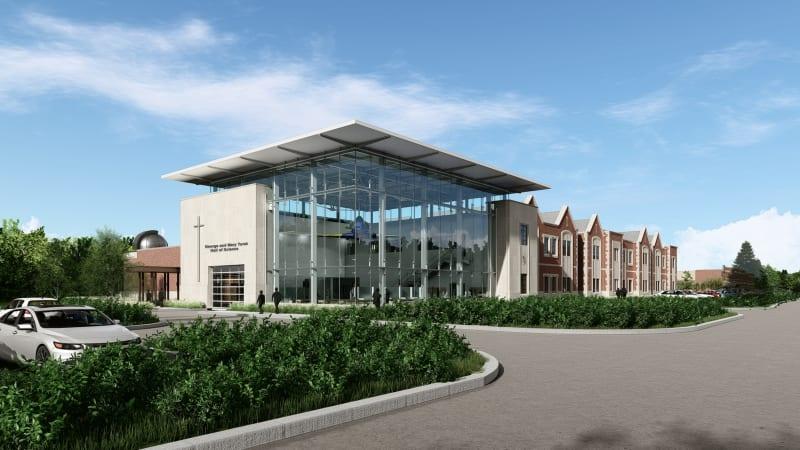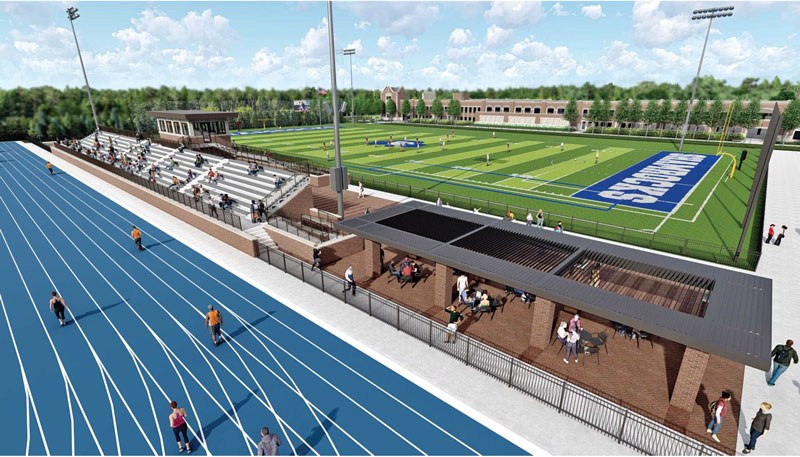Religious Values And Academic Prowess At Michigan’s Catholic Central High School
The new $62 million wing of Detroit Catholic Central offers science labs, flight simulation, celestial observatory, and robotics. It also offers Catholic values.

Basilian Father Patrick Fulton told the Register that the students and parents find a parish-like environment at Detroit Catholic Central High School (CC) where Mass, Adoration, and the sacraments form the core of their experience. It is the religion and resulting “brotherhood” among students that fosters a 100% college acceptance rate for graduates, he said.
Paraphrasing St. Francis of Assisi, Fulton said that as principal and theology teacher, he seeks to evangelize at all times and, if necessary, to use words with students. In explaining his students’ academic success and spiritual formation, he said, “It can be through informing them with theology classes and what the Catholic faith looks like. Those are the nuts and bolts,” he said in an interview with the Register. But he has found that “It is how we are as a community. They call it ‘brotherhood,’ but we call it ‘Christian community,’ through the witness of their teachers and how they relate to their students.”
Not only teachers, but athletic coaches, Fulton said, have a deep influence in students’ lives. He said that students volunteer to be formed as athletes. “Coaches know that they are not only forming students but are also evangelizing,” the priest said. CC is a local powerhouse in football, soccer, and ice hockey.
Detroit Catholic Central was founded in 1928 by the Congregation of St. Basil, and is now located in Novi, a suburb of Detroit. With over 1,000 male students, Catholic Central is the largest non-public high school in Michigan. Exhibiting the “Basilian tradition of goodness, discipline, and knowledge,” as averred by its website, 75% of the school’s student body is Catholic, but is open to students of other faiths. It boasts more than 250 National Academic Achievement Recognitions by the College Board and National Merit Foundation since 2019, as well as a 100% college admission rate.
The Congregation of St. Basil, who ministers at the school, was founded in France in 1822 in the aftermath of the French Revolution. In the mid-1850s, Basilians came to North America and began founding schools and staffing parishes. There are now three high schools in the U.S. operated by Basilians. The order’s headquarters is in Toronto, Canada.
“No other congregation in the history of the Church was founded by ten men. They had different personalities and characteristics. That flows into why CC has such a healthy community and brotherhood. Those founders made it work and it is part of our ethos here to make it work. Basilians don’t have a rule, like the Benedictines. Our founding document is ‘The Basilian Way of Life.’ It is written to be exhortative and inviting. That’s the way we live at CC,” Fulton said.
He added that at CC, students are told: “We are not forcing you. We are inviting you, in freedom.” As testimony to the success of the Basilian approach, he noted that 21 students entered into full communion with the Church this year.

Catholic Central has just inaugurated a $61 million expansion that incorporates new classroom spaces and science labs, including an astronomical observatory, greenhouse, machine shop, auditorium, and flight simulators. The George and Mary Turek Hall of Science adds 57,000 sq. ft. of learning space, science and engineering labs, fabrication and machining room, lecture hall, computerized Celestron telescope, greenhouse, and maker space. The school has acquired 149 acres of land to be used for athletics and further expansion.
Amy Ely – who heads the STEM department – told the Register she is involved in managing parts of the building coming into play. Students are required to take three years of science courses, which include robotics, computer assisted design and machining, engineering, chemistry, physics, and biology. Advanced Placement courses are offered in math and the sciences, as well as other fields. The school now has a sophisticated full-motion flight simulator, allowing students to work towards a pilot’s license.
When asked how CC teachers incorporate the Catholic faith and values in science courses, Ely said, “I have not seen a classroom where a teacher has not exemplified Catholic values, showing their honor, trust, integrity, help students and generally setting an example. I don’t see how in a physics classroom where they would talk about specific Catholic values, but I can see that they exemplify them and expecting them based on our tradition of ‘Goodness, Discipline, and Knowledge.’” Teachers expect the foregoing behaviors because they themselves exemplify those behaviors, she said.
Admissions director Jake Marmul said biology teachers cite Pope Francis’s environmentalist encyclical Laudato si, saying, “We have integrated those things in classrooms. We talk about the ethics side of things. When you are working in the STEM world, there’s the ability and the ‘Should you?’, and the ‘How?’ and the ‘Why?’. Father Fulton has said that science answers the ‘How?’ but our religion answers the ‘Why?’”
Director for Guidance Counseling Patrick O’Brien said he credits the level of instruction and Catholic faith that has led to students’ acceptance at universities and community colleges. “We have great teachers and great leaders, not just the teachers. They show accountability and are good examples.” There are seven counselors on campus who provide guidance in course selection and college entrance exams, as well as support for mental health, family life and gaining maturity, he said.
When asked about challenges he faces as a counselor, such as cellphone use and social media such as Snapchat and Instagram, O’Brien said, “Students grow up and become young men in this world of distractions, temptations, social media. We certainly have students who are striving towards their goals, but there are also students who get sidetracked and addicted to their devices.” Students, he said, can rely on teachers and counselors to guide the use of social media and technology, while also noting that cellphone use is restricted on campus.
O’Brien underscored the value of an all-male student body for boys’ achievement and learning. “It can definitely help the boys to focus on certain topics that has their attention, but I also feel that it can allow boys to let loose and be funny without having to impress the opposite sex. It’s a more comfortable environment especially as they grow up. There are opportunities outside of the school: dances and collaborating with other schools. But I feel that in the schooling, 8 to 2:45 every day, in a large school like ours they are here to focus on what they need to focus on.”
As part of the focus on brotherhood among students, O’Brien said that school clubs and sports allow them to meet others from different backgrounds. “The shared experience of Detroit CC brotherhoods transcends being a baseball or football player and not being involved in sports. They really get to know each other by senior year,” he said. In addition, there is an active tutoring program led by students.
One of the stand-out students at CC this year was Javier Farfán-Morales, a National Merit Scholar of Guatemalan parentage who will start this fall at University of Michigan. “It changed my life,” said Farfán-Morales, who was a soccer player and member of the school band. “My life is like a pyramid founded on my family, to which I have added my efforts and what I learned at CC,” he told CNA. Validating Father Fulton and staff, Farfán-Morales underscored how important the CC “brotherhood” has been in his studies and spiritual development.